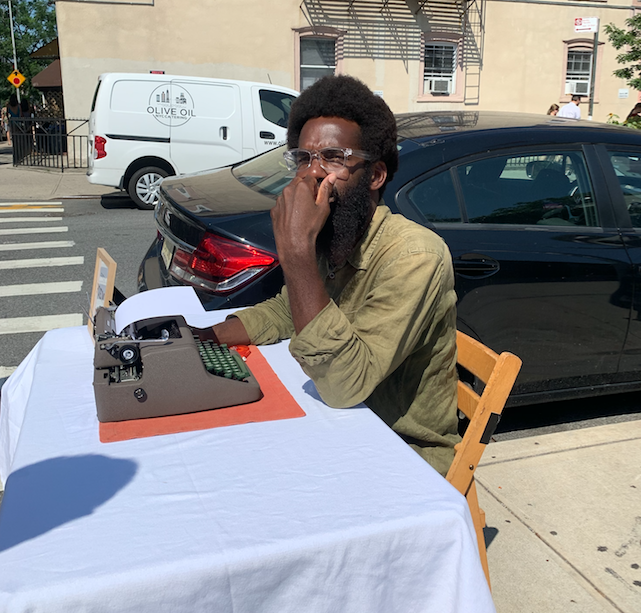Featured Articles
Peddling Poetry–On Demand
By Mikaela Querido
Staff Writer
Mira Rosenkotz’s handwritten sign, made of poster board and Magic Marker, announces what she’s peddling.
“POEMS …Your topic…Your price.”
A customer asks Rosenkotz to convey her first impressions of the stranger standing in front of her.
Rosenkotz pauses, getting her bearings. She begins, her fingers working the keyboard.
Tch-tch-cha-tch-tch-cha … The staccato of her typewriter joins the cacophony of Washington Square Park.
Another pause. She scratches the back of her neck and stares up. She goes back to the typewriter … Ding … The return lever takes her to a new line, an empty space.
When she’s done, she pulls the sheet out of the typewriter, examines it, signs it and gives it to the patron.
Rosenkotz is one of several poets making poetry on-demand in New York City. She does her creating in Washington Square Park and Central Park, writing about 20 to 30 poems a day. For $3 to $5 dollars patrons get, for example, this:
Let’s take this month by storm … and let it bleed into the next twelve … for what a rush it is to feel like you belong … and for the sun to whisper it to you every morning … when she pulls you out of the bed … and throws you into the world
That poem was about Pride Month.
“Poetry is something that I love and am passionate about,” the Mount Holyoke College senior said. This is her second summer of writing on-demand poetry. She uses a typewriter because she already had it—it was a gift—but mainly for added uniqueness and novelty.
It “creates a conversation,” said Rosenkotz, a creative writing and studio art major.
“I can’t backspace, I can’t erase anything,” she added. “But I like having it where I can’t go edit it.”
In other words, what you get is what she gives you. And you get it in an instant, relatively speaking, said Rosenkotz, who types poems in two to five minutes.
Lynn Gentry, whose website indicates that he’s written on-demand poetry all around the country for the past 10 years, said, the poems can be on any topic or crafted in various poetic forms. “It’s anything.”
It doesn’t require a whole lot of musing, said Peter Chinman, another on-demand poet.
“I try to put as little thought into it as possible. The thoughts usually get in the way, when I am actually trying to say something,” Chinman said.
“The biggest thing that holds people back in writing,” Julia Catalano, a college student from Staten Island who writes on-demand poetry during the summer, “is hesitation, doubt, and wanting everything to be perfect.”
Rosenkotz also mails poetry to people who cannot reach her in person but can contact her online. She sends a digital picture, for instant gratification, then, drops the original copy in postal mail. People like the tangible item, rather than simply a picture, Rosenkotz said.
Gentry, on other hand, used to snail-mail poetry to patrons, but he stopped. He didn’t feel enough of a personal connection to his customers to keep dropping poems at the post office, he said.
“Poetry is figuring out what makes each relationship unique,” said Gentry, who prefers asking his patrons plenty of questions. He looks at his poetry as a connection to people. He wants to pull the poetry out of people.
“You have to connect to the people,” he said. “If not, get out of the industry.”
Like Rosenkotz, Gentry uses a typewriter. It’s his “instrument,” he said. “With the typewriter, I hear infinite rhythm.”
Doing on-demand poetry is more than a matter of churning out words and ideas. Doing it under the summer sun makes the work “hard.” Rosenkotz said. “It’s hot and gross.”
Nevertheless, Gentry said, “you are providing a service to people … So, if you have to burn, you better burn. If you have to freeze, you better freeze.”
Also, on-demand poets sometimes tackle difficult topics, Gentry said, such as death or rape. “It is the hardest poetry to write,” Gentry said.
No matter the topic, Rosenkotz loves the challenge of this art form. She never knows what her next poem will be about, until someone approaches her.
“The variety,” she said, “is fun.”


